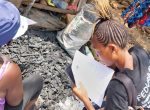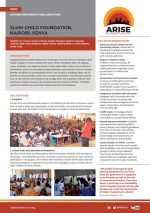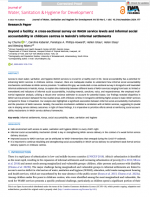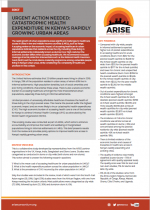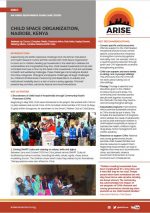In May 2023 a health and wellbeing survey of informal settlement residents in Cockle Bay, Moyiba and Dwazark, in Freetown, Sierra Leone was undertaken by ARISE partners. This blog acts as a summary, highlighting some of the main findings. We also have the full survey report available for download. Background This survey builds on the […]
Through the Responsive Challenge Fund, ARISE partnered with local NGO PHASE Nepal to carry out implementation research to assess the status of living conditions and accountability in informal settlements through a mixed method study. This book was produced with the support of community members from the Manohara and Namuna Basti informal settlements of the Kathmandu […]
We’re thrilled to announce the publication of our colleague Professor Sabina Faiz Rashid’s book Poverty, Gender and Health in the Slums of Bangladesh: Children of Crows. Sabina is the Mushtaque Chowdhury Chair in Health and Poverty at BRAC’s James P Grant School of Public Health and ARISE PI in Bangladesh, and has written about the […]
Supported by the ARISE Responsive Challenge Fund, the African Population and Health Research Centre worked with Slum-Child Foundation (SCF) to address water, sanitation and hygiene (WASH). Clean water often costs more in informal settlements when it is provided by intermediaries, reducing the amount of water people can afford for handwashing. With a lack of space, […]
Abstract Access to clean water, sanitation, and hygiene (WASH) services is crucial for a healthy start in life. Social accountability has a potential for enhancing WASH services in childcare centres. However, there are inadequate studies to understand how informal social accountability mechanisms contributes to WASH service provision. To address this gap, we conducted a cross-sectional […]
Supported by the ARISE responsive challenge fund, the African Population and Health Research Centre (APHRC) worked with the U-Tena youth organization to address solid waste management (SWM). SWM entails collecting, treating, and disposing of solid material that is discarded because it has served its purpose or is no longer useful. SWM is a challenge in […]
In this interesting, new video learn about the program run by an alliance of SPARC, National Slum Dwellers Federation and Mahila Milan (a women’s savings collective) to support program those with TB and their families. This work was undertaken as part of the ARISE consortium’s work in India.
This brief on catastrophic health expenditure in Kenya’s rapidly growing urban areas look at how the rapid growth of urban populations poses significant challenges to healthcare access in cities in low and middle-income countries (LMICs), such as Kenya. A scoping review on the economic impact of accessing healthcare in urban populations indicates that residents across […]
Supported by the ARISE Responsive Challenge Fund, the African Population and Health Research Centre (APHRC) worked with Child Space Organization to reach out to children heading up households in the attempt to address the vulnerabilities and marginalities they face. Child headed households (CHHs) refer to families that have a minor as the head of the […]
Abstract This article critically reviews the literature on urban informality, inequity, health, well-being and accountability to identify key conceptual, methodological and empirical gaps in academic and policy discourses. We argue that critical attention to power dynamics is often a key missing element in these discourses and make the case for explicit attention to the operation […]
